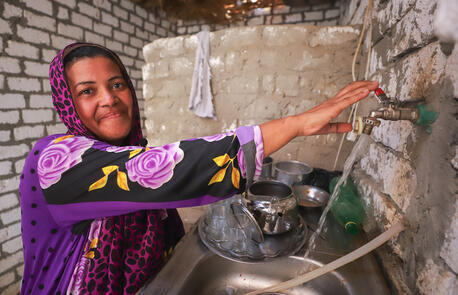
UNICEF and Baxter International Foundation Partner to Protect Children's Health in Egypt
UNICEF and the Baxter International Foundation are improving access to safe water, sanitation and hygiene (WASH) services in homes, schools and health care centers in five water-challenged regions across Egypt: Assiut, Aswan, Luxor, Minya and Qena.
Ahlam Ayat is grateful that she now has a connection to safe, clean water in her house in Assuit, Upper Egypt. It used to be very difficult for her to fetch water for her family. "When there was no water, my children and most of the children of the neighborhood helped their mothers to fetch water in the vicinity. Thankfully, we now have water in our house, and we finally feel safe," Ayat said. "Now I don't have to worry about saving water for the household or even if the water we got from outside is contaminated or clean."
Many families like Ayat's face a daily challenge: where to get clean, safe drinking water. In households without water access, the job of collecting water often falls to women and girls, who often have to walk for hours to reach water sources, sometimes in unsafe places. Bringing water systems into their homes and communities can drastically improve their lives. The less time girls have to spend fetching water, the more time they have for attending school, playing with their friends and helping lift up their communities.
Access to safe water, sanitation and hygiene services saves lives
With the support of the Baxter International Foundation, UNICEF is equipping more than 4,000 vulnerable households with safe water and sewage connections in Assiut, Aswan, Luxor, Minya and Qena, five of Egypt's most water-challenged regions.
Improved water, sanitation and hygiene (WASH) services in health facilities are crucial to ensure the quality of care and minimize the risk of infection for patients and their families, as well as health workers and others in the community. Through the partnership, UNICEF is working with the Government of Egypt to help national health workers deliver high-quality WASH and nutrition services in the same regions.
UNICEF is also supporting more than 100 primary health care units with the rehabilitation of WASH infrastructure (toilets, handwashing basins, sewage systems), installation of water tanks and distribution of basic hygiene kits to children visiting these centers.

Climate-smart, energy-efficient solutions
In addition, 50 health centers in the country will adopt climate-smart models through the installation of energy-efficient devices including solar panels and efficient electrification.
Through this partnership, UNICEF is also supporting 150 schools and 40 nurseries in implementing climate-change action plans and mitigation strategies. Teachers, caregivers and children are also taking part in activities to raise awareness around sustainable water, clean environment and best hygiene practices.

Thanks to the Baxter International Foundation for their support as UNICEF works to protect and promote the health and well-being of children throughout Egypt.
HOW TO HELP
There are many ways to make a difference
War, famine, poverty, natural disasters — threats to the world's children keep coming. But UNICEF won't stop working to keep children healthy and safe.
UNICEF works in over 190 countries and territories — more places than any other children's organization. UNICEF has the world's largest humanitarian warehouse and, when disaster strikes, can get supplies almost anywhere within 72 hours. Constantly innovating, always advocating for a better world for children, UNICEF works to ensure that every child can grow up healthy, educated, protected and respected.
Would you like to help give all children the opportunity to reach their full potential? There are many ways to get involved.





